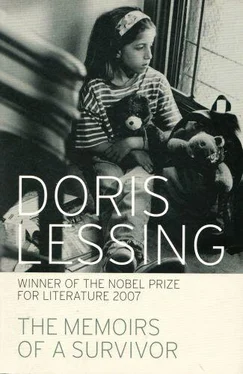'The Ryans', no longer an extreme, disappeared into society, were absorbed by it. As for our Ryans, the actual family described here, there was still a nucleus somewhere near, the mother and three of the smaller children: the father had died in an accident to do with drink. All the older children had left the city, except for two in the police. June had attached herself to Gerald's household, and one of her younger brothers was there part of the time. 'The Ryans' had turned out to be nothing special, after all. In their humble, non-demanding way they had been part of our society, even when they had seemed not to be: they had been formed by it, were obedient to it. They were as far from what was to come afterwards, and quite soon — when 'the gang of kids from the Underground' appeared in our lives and wrecked Gerald's household — as we were, or had been, from 'the Ryans'.
I use that phrase Gerald's house as people had once said the Ryans, meaning a way of life. Temporary ways of life, both: all of our ways of living, our compromises, our little adaptations — transitory, all of them, none could last.
But while they lasted, so much clung to and worked at, like Emily with her duties in Gerald's house. Which I now visited, for Emily and I had not been back down in our rooms for more than a few minutes when the doorbell went and it was June, all bright anxious smiles. At first she did not mention the robbery, but sat on the floor with her arms around Hugo. Her eyes were on the move around the room, to see where the things she had taken away and been forced to return, now were. Most were out of sight, back in cupboards and storeplaces, but there was a bundle of fur pieces on a chair, and at last she said, in a spurt of desperate restitution: 'That's all right, is it? I mean, it's all right?' — and even got up to pat the fur, as if it were an animal she might have hurt. I would have liked to laugh, or to smile, but Emily was frowning at me, very fierce indeed, and she said gently to June: 'Yes, everything is fine, thank you.' At which the child brightened up at once, and she said, turning her attention to me with difficulty: 'Will you visit us? I mean Gerald says it is all right. I asked him, you see? I said to him, can she come, do you see what I mean?'
'I'd like to very much,' I said, having consulted Emily with my eyes. She was smiling: it was the smile of a mother or a guardian.
But first Emily had to prepare herself: she emerged in due time from the bathroom, her hair newly-washed and combed down, her clothes neat, her breasts outlined in blue cotton, cheeks soft and fresh and smelling of soap — a tidy package of a girl, all ready to present herself to her responsibilities, to Gerald. But her eyes were sombre, defensive, worried, and there beside her was June the child, and her face was laid open and absolutely undefended in a trustful smile at Emily the woman — her friend.
We walked, the three of us, through streets dusty and as usual littered with paper, cans, every kind of debris. It would be necessary to pass a tall hotel built in tourism's last fling, and I was watching to see the route Emily would choose: every individual picked out a careful way between hazards in these streets, and one could tell a good deal about a person's nature by whether she chose to go past a dubious building, taking a chance she might be seen from it as prey or a target, or move into another street altogether; by whether she boldly called greetings into defended gardens or walked past quickly with an averted face. Emily went direct, walking carelessly through all the rubbish. Not for the first time I marvelled at the different standards for in and out of doors: inside her home, Emily was as pernickety as a little cat, but outside she seeme dnot to see what she walked through.
The hotel had been taken over by squatters long ago: another obsolete word. But all kinds of people lived there, although as a machine the place was useless, like all the complicated buildings which had depended on technicalities.
Looking up the tall shaft, today outlined against an over — hot and dusty sky, it showed ragged and patched, like lace: windows had been smashed or blown in. Yet the upper parts of it bristled everywhere with devices. Outside one window would be a whirr of light — someone had rigged up a little windmill for catching wind and turning it into power for hot water or lighting. Outside others were slanting discs held out on what looked from down in the street like spider webs: these were solar snares of various kinds. And among these up-to-the-minute contraptions danced and dangled coloured washing held out into the air on timeless string and wood.
Up there it looked gay and even frivolous, with the blue sky as backdrop; down here rubbish was banked up all around the building, with pathways cleared through it to the doors. The smell — but I'll ignore that, as Emily and June seemed able to do so easily.
Recently I had gone into the building, had gone up to the very top: there I stood, looking down over the city which — I suppose not surprisingly — did not look so very different than it did in the years before the machines stopped working. I had gazed down and fancied myself back in time: all of us did this a great deal, matching and comparing, balancing facts in our minds to make them fit, to orient ourselves against them. The present was so remarkable and dreamlike that to accommodate it meant this process had to be used: It was like that, was it? Yes, it was like that, but now… As I stood up there, thinking that there was one thing missing, an aeroplane, a jet rising up or descending to the airport and dominating the sky, I heard a soft droning, a bee's sound, no louder, and there it was — a plane. A little one, like a grasshopper, painted bright red, all alone in the empty sky where once so many great machines had filled our lives with noise. There it was, a survivor, holding perhaps the police or the army or high officials off to some conference somewhere to talk, talk, talk and pass resolutions about our situation, the sad plight of people everywhere in the world — it was pretty to look at, it lifted the spirits, to see that little thing glittering up there in emptiness, off to some place which no one looking up at it could get near these days except in imagination.
I had walked slowly down through the erstwhile hotel, exploring, examining. I had been reminded of a new township built for African labourers outside a large mine in Africa that I saw in the after all not-so-long-ago days when the continents were close together, were a day's journey away. The township covered acres, had been built all at one time, and was made of thousands of identical little 'houses', each consisting of a room and a small kitchen, a lavatory with a wash-basin. But in one house you would see the pattern of tribal village life brought to the town almost unchanged: a fire burned in the centre of the brick floor, a roll of blankets stood in a corner, and two saucepans and a mug in another. In the next 'house' a scene of Victorian respectability: a sideboard, dining table, a bed, all in hideous varnish, with a dozen crocheted articles for ornament, and a picture of Royalty on the wall opposite the entrance so that the Queen, in full military regalia and the observer could exchange glances of approval over this interior. In between these extremes was every variation and compromise: well, that was what this hotel had become, it was a set of vertical streets in which you could find everything, from a respectably clean family making jokes about conditions in England before the advent of proper sewage disposal and carrying chamber pots and pails down flight after flight of stairs to the one lavatory that still worked, to people living, eating, sleeping on the floor, who burned fuel on a sheet of asbestos and pissed out of the window — a faint spray descending from the heavens these days need not mean imminent rain or condensing steam.
Читать дальше
Конец ознакомительного отрывка
Купить книгу












